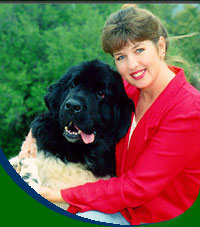 |
 |
|||||||||||||
|
|
||||||||||||||
|
We Share Because We Care: Dining with Your Dog or Cat by Kymythy R. Schultze Queen Victoria did it. Mark Twain did it. Even Edgar Allen Poe did it. And if you live with a dog or cat as a member of your family, you may do it too! It dates back to the time when early human first invited their primitive pet into the sanctity of their home and, much to the animal’s delight, their kitchen. Sharing food with our animal friends is a time-honored tradition that has helped bond our species together. Plus, it’s fun! It brings out the nurturer, the companion, and the guardian in us. It feels good to share a special treat with a furry friend, and millions of animal-lovers do it on a regular basis. But, before you slip that snack under the table, you should determine if it will help or harm your pet. The old adage that you shouldn’t feed table scraps to your pet is certainly valid if the food from your table does not promote good health. Many of today’s processed foods are not good for any body; human, canine or feline as they contain rancid fats, sugar, and questionable chemicals. They offer little nutritional value when compared to fresh natural foods. And cooked leftovers such as meat fat and others may smell good to your pet, but can lead to health problems. Also many dogs and cats, like many humans, have negative reactions to ingredients they may be sensitive to such as dairy, wheat, yeast, and more. Home-made treats are a healthy and delicious option to processed products. And a wonderful side effect of making sure the food you share with your pet is healthy is that your health can benefit too! Nutritious treats and snacks can easily be made at home and you’ll have the satisfaction of knowing exactly what you’re giving your animal companion, and the other members of your family. If you have children in the house, then you know they are a magnet for hovering hounds and mooching mousers. By choosing treats wisely, you can rest assured that both the kids and pets are sharing food that is good for them. And children learn from the example set by adults, so preparing and enjoying healthy and delicious food is an invaluable habit to instill in them. Here is a recipe that is super-easy to make and so delicious that everyone in your house will want some. And that’s okay; they’re good for everyone…you and your pets! Almond Fudge Logs 1 cup raw almond butter 1/2 cup raw shelled almonds, chopped 1/4 cup raw carob powder 1/4 cup raw honey Combine almond butter, carob, and honey until well blended. Form into “log” shapes (if they’re too sticky, add more carob) or roll into 1” balls. Roll in chopped nuts, chill until firm, and slice logs into pieces. Keep refrigerated. Makes about 1 1/2 cups, or three 7” logs. The nutritional scoop: Cocoa and chocolate contain theobromine, an alkaloid that can be lethal for some animals, including dogs and cats. Hooray for carob, the chocolate alternative! Not only is it safe and delicious, but it’s nutritious as well, and contains 60 percent fewer calories than chocolate. Carob is a great source of calcium, with approximately 358 milligrams per cup. It also contains appreciable amounts of iron, potassium, magnesium, copper, selenium, B vitamins, and vitamin A. With 4.8 grams of protein per cup, it also contains many essential amino acids. Carob’s high pectin content makes it useful for digestive disorders, especially diarrhea, and it’s easy to digest. Carob is mentioned often in historical texts (including the Bible) as a food and medicine for both humans and nonhumans alike. In ancient times, almonds were also used as both food and medicine. Raw almonds are a good source of enzymes, calcium, magnesium, and vitamin E. Food-source vitamin E is an antioxidant that may provide important health benefits including the ability to inhibit lipid (fat) oxidation. Purchase nuts from a store that restocks regularly, as you’ll want the freshest ones possible. Store shelled almonds and almond butter in the refrigerator. To get the most flavor and nutrients from your food, you’ll want to purchase organically grown food whenever possible. Organically grown food is the fastest-growing sector of agriculture today, and for good reason: It has higher levels of nutrients, including cancer-fighting compounds, than most conventionally grown food. Nutritionally, you get more for your money with organic food; plus, the Environmental Protection Agency warns that 60 percent of the herbicides, 90 percent of the fungicides, and 30 percent of the insecticides that may be used on non-organic crops are carcinogenic (cancer-causing). Plus, organically grown food usually tastes much better than conventionally grown food! If you cannot get organically grown food, don’t let it deter you from enjoying the great taste and nutrition of fresh whole foods. Buy the best quality that you can and be sure to wash all produce before using. This recipe is a great alternative to unhealthy chocolate sweets. In fact, everyone in your family may love them so much that you’ll need to remind yourself that rich treats like these are best given in moderation. They should not replace regular meals of species-appropriate food. This simple recipe will allow you to share a treat with your pet and also treat yourself to peace of mind, knowing that it is actually good for both of you! Sharing healthy food is not “spoiling” a pet any more than it would be a child; in fact, when you choose recipes to prepare that are delicious and nutritious, you truly prove how much you value those you care about. And you’re in very good company: Famous physician, humanitarian, and philosopher Dr. Albert Schweitzer shared food and care with his animal friends and was moved to say “We must realize that all life is valuable and that we are united to all life. By ethical conduct toward all creatures, we enter into a spiritual relationship with the universe.” Bon appétite! Kymythy R. Schultze is a clinical nutritionist and has been a trailblazer in the field of nutrition for almost two decades. The recipe above is from her new book “The Natural Nutrition No-Cook Book: Delicious Food for You…and Your Pets!” She is also author of the best-selling book “Natural Nutrition for Dogs and Cats: The Ultimate Diet.” Both books are published by Hay House, Inc. For more information go to www.kymythy.com |
|||||||||||||
|
© 2008 Kymythy R. Schultze |
||||||||||||||


